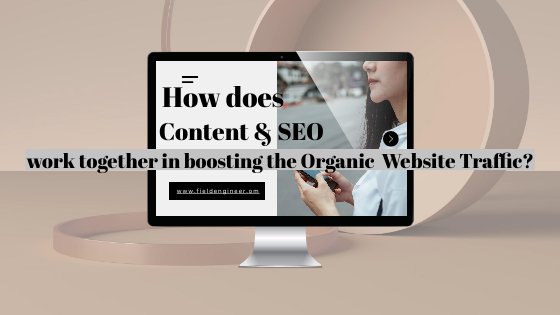What is SEO?
SEO is an abbreviation for Search engine Optimization. In simple terms, it is a method that allows sites to be easily located and rank in Google search, but also to rank on search engines, which include other search engines, such as Yahoo, Bing, and Duck Duck Go as well as others. However, Google is the top-ranking search engine. The search results on Google are considered to be normal. The rank of a website will be directly related to the number of people who visit it. If the site is well-ranked is more likely the site gets more visitors. A higher rank is a sign of more revenue for businesses. According to Reports and Data, The Search Engine Optimization market size is expected to reach USD 122.11 Billion in 2028 and register a CAGR of 9.6% during the forecast period.
Why is it important to be found on Google search?
As mentioned above, It’s not just Google Search but any search engine must show your website’s address in the results for the search which is the main objective of SEO. This is due to the current technological advancements all things are online, even companies. The websites of the past were primarily for informational reasons, but nowadays websites have become the virtual business centre.
What are the benefits of SEO?
SEO is very beneficial to companies or websites to create an online reputation. It is not just helpful in establishing an online presence, it can also help in bringing more traffic to the site, i.e., enabling greater visibility of the site to more people, leading to the creation of revenue and business as the ultimate goal.
How can you make your website SEO friendly?
A website can be SEO-friendly by making sure that the site is search engine friendly. There are certain technical elements of SEO specifically the on-page aspects of SEO completely met; make sure that the site is search engine friendly and lets search engines crawl and index web pages as well as the site in general.
How can you measure your website’s SEO performance?
The most important parameters used to evaluate the SEO performance of the site are the keyword positions, and organic traffic along with an assessment of the Domain & Page authority of the site, which is heavily influenced by the strength of backlinks. The higher the quality of backlinks, the better other parameters contribute to improving SEO performance.
How can you improve your SEO?
Consistent SEO efforts that focus on every aspect like Onpage SEO keywords, keyword positions attractive content, quality and quantitative backlinks, organic traffic that is good, and so on. All of these when accomplished will definitely pave the path to improving SEO.
SEO is about connecting you with your audience:
Content plays a key role in connecting with the audience. While building the online presence, it’s always necessary to be cautious in providing the proper business-relevant content to the audience with straight CTAs helping the audience to get in touch with the business owner without any hassles.
Content needs to be useful to the audience: It’s always important to note that the content promoted to the audience needs to be authentic. For instance, even in a shortage of information, ensure not to provide improper or irrelevant content that might lead to spam & penalization of links through the search engine. In the end, it costs the reputation of the business; on the other end affects the website or business performance. Moreover, the content should be in such a way that it is accessible by the search engines with simple language, straight to the point, proper linking with the website and content, etc.
SEO is not about tricking the search engines: Search Engine algorithms keep on changing annually. With the update of algorithms, the search engine results too are affected, and very rarely, the effects are drastic. Usually, with every update, the search results fluctuate to some extent. But, some tricks still help in managing the results, which at times is known as a cheat sheet. But, these kinds of tricks & techniques are considered to be Black Hat SEO which is least suggestible because this kind of SEO force the website to land with a spam score or a drastic downfall in all the parameters of the website and results in poor website performance.
How SEO improves Organic Traffic: There are many examples of websites that have benefited a lot from organic SEO efforts. Organic SEO strategies such as On-page SEO, Off-page SEO include keyword research, content with proper keywords and accurate keyword density, and link-building as a major activity. Organic
Traffic is nothing but the overall Website performance, which is derived through different means of Digital Marketing. All the On-page activities exactly met forms half of the SEO done, and the rest of the off-page SEO is a consistent process that needs continuity. Though the results aren’t viewed instantly, the results are fruitful over a period of time.
Let’s look at the example of an IT website that has good performance and results in search engine optimization due to excellent business-related keywords that have been that are added to the site and its blog’s contents. Instead of just organic efforts it is the high quality of the site and the content has improved the website’s performance, but not dramatically however the site has impressive results.
The website is highly ranked in search results for terms such as Managed Services Providers (MSP), Network Operations Center (NOC), and IT Services. The results have helped a lot of companies and organizations to provide quality services. This is one of the factors behind the growth in organic traffic since a lot of people went to the website and took advantage of the services.
If you visit the site it will be clear that the design and layout of the site are professional and informative. They reach the intended people. Content plays a major part in the primary pages of the site and blog pages and should have the appropriate amount of keywords in the correct quantity of content. Content that is of high quality helps the site rank better in search results and can also improve the position of keywords, which ultimately improve the results of a search.
Organic traffic is always recommendable: Undoubtedly, organic traffic is comparatively better than Non-organic traffic. This is because non-organic traffic on a large scale is nothing but paid traffic. Paid traffic is instant, quick, and doesn’t retain for long. This traffic doesn’t even assure relevant business closures.
Finally, as always said, “Content is the King,” be it the website content or the organic promotional content that best describes the business. The more appealing the content is, the more organic results are derived. Nonetheless, the results are never spontaneous but are retained over a period of time in the long run.
However, organic and non-organic activities are essential to be a part of the equation as otherwise, non-organic activities by themselves aren’t likely to aid at all. Although 24/7 Digital Marketing activities are necessary to maximize the results of any business, organic actions or organic SEO by themselves occupy more than the base of results.
About Author:
The author of the content is Mr. Mustafa Ali, working as Digital Marketing Manager at FieldEngineer, a Global On-demand Freelance Marketplace very much successful in implementing the organic strategies of Digital Marketing which is evident from the organic results achieved to date and continuing.

